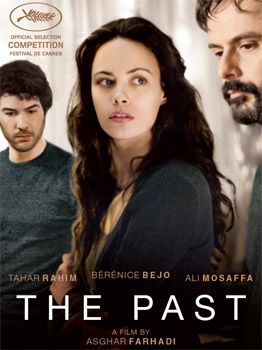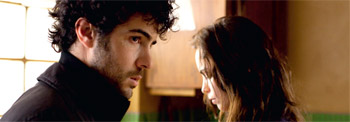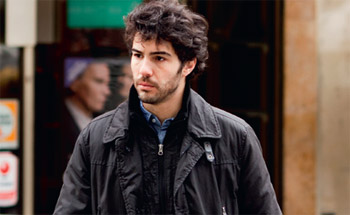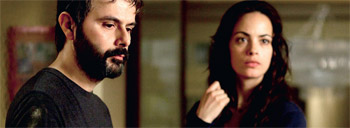Asghar Farhadi The Past Interview

Asghar Farhadi The Past Interview
Cast: Bérénice Bejo, Tahar Rahim, Ali Mosaffa, Pauline Burlet, Elyes Aguis, Jeanne Jestin, Sabrina Ouazani, Babak Karimi, Valeria Cavalli
Director: Asghar Farhadi
Genre: Drama, Mystery
Rated: PG
Running Time: 130 minutes
Synopsis: Following a four year separation, Ahmad returns to Paris from Tehran, upon his French wife Marie's request, in order to finalise their divorce procedure. During his brief stay, Ahmad discovers the conflicting nature of Marie's relationship with her daughter Lucie. Ahmad's efforts to improve this relationship soon unveil a secret from their past.
The Past
Release Date: February 6th, 2014
Interview with Asghar Farhadi
Question: Between A Seperation and The Past, you worked on another film project. What happened?
Asghar Farhadi: I did write another script after About Elly, while I was staying in Berlin. Then I shot A Seperation and my French distributor, Alexandre Mallet-Guy, asked if he could read that script. He liked it and said he wanted to produce the film, either in Germany or in France. After a few trips, I chose Paris and started working on the project. One day, we were in a café, talking about it and all of a sudden, I said I had another story in mind. It was only a synopsis but as I started telling the story, I realised something was taking shape and developing. Another narrative was coming to me. So we gradually shifted to this story, I developed it and quickly had a treatment ready. That's how The Past was born. Being in Paris meant a lot. When you want to tell a story dealing with the past, you need to set it in a city like Paris that exudes the past. This story couldn't have taken place just anywhere.
 Question: But historic Paris is not shown in the film…
Question: But historic Paris is not shown in the film…
Asghar Farhadi: I was very careful not to abuse the historic aspect of the architecture of Paris and not to have a touristic approach to it. I decided at a very early stage that the main character's home, in which a great part of the film takes place, would be in the suburbs and Paris would appear in the background, taken for granted. The pitfall for filmmakers working in an unknown setting is to highlight in the film the first things that catch their eye. I tried to do the oppo-site. Since I was fascinated by the architecture of the city, I decided to look beyond that and reach something else.
Question: What's the writing process like? How do you build the story?
Asghar Farhadi: All my stories are written in a non-linear way. They don't go from point A to point B. I always have several stories developing simultaneously and they come together during a shared situation. Here, I had the story of this man who's been living away from his wife for a few years and now is traveling back to her to finalise their divorce. Then, I had the story of a man with a wife in a coma who has to take care of his child. These are elements that expand separately then converge to a single situation. I write intuitively. I start with a synopsis and immediately question it, trying to find out more about the little information that I have. Since I know that this man has come to get a divorce, I ask myself why he left four years ago? And now that he has returned to his wife's house, what is going to happen there? So many questions emerge from these few lines that by answering them the whole story is constructed.
Question: In what way did the observation of the French way of life influence the script?
Asghar Farhadi: I did a lot of thinking about the differences. What would have been different if the story took place in Iran? In my films, the characters express themselves indirectly. It's part of my culture but I also use it as a dramatic resource. That is less of a custom in France. Of course, it depends on the context, but generally speaking, the French are more straightforward. So I had to adapt the development of my French characters to that new parameter, which wasn't easy and took time in my writing process.
Question: Curiously, the Iranian character is the one that pushes the others to speak…
Asghar Farhadi: He's a kind of a catalyst. He puts the others in a condition for speaking, for saying things that had remained unsaid for a long time. But he's not even aware of it. One of my guidelines was not to define my characters by their nationality or their flag. Their behavior is determined by the situation they are experiencing. In a crisis situation, differences tend to disappear.
Question: One of your actors says the idea of the film was triggered by your visit to a person in a coma...
Question: Does the complexity of today's life increase these dilemmas?
Asghar Farhadi: Probably. One tends to consider the future blurred because it's unknown. But I think the past is even more unclear and opaque. It should feel clearer and closer to us now, as we keep traces from it. But photos and emails don't help our past get any clearer. Nowadays, life may tend to move on, neglecting the past. But its shadow weighs on us and holds us back. It seems to be as true in Europe as it is in the rest of the world, that no matter how determined you are to embrace the future, the weight of the past is still heavy on our minds.
 Question: How did you choose Bérénice Béjo?
Question: How did you choose Bérénice Béjo? Asghar Farhadi: I first met her during a trip to the US, where she was promoting The Artist. I immediately found her warm and genuine. One of those people you feel you can connect to. Her performance in The Artist confirmed for me that she was also an intelligent actress. These two personality traits must be present in an actor for me to choose them: being smart and exuding a positive energy on the screen, someone appealing with whom the viewers enjoy spending time.
Question: She said that you were looking for something in her face on the first day of the rehearsals. What was that?
Asghar Farhadi: Doubt, which is central to Marie's character. Bérénice herself doesn't doubt very much. But at an early stage of the rehearsals, she proved that she was able to perform doubt.
Question: Marie's character is the one that provokes situations, that makes things move forward…
Asghar Farhadi: She is the one who is the most determined to move on and not to be stuck in the past. But who knows if she'll be able to do it? Men are more burdened by the past. In the last scene with Marie, she walks towards us, towards the camera. Ahmad is behind her and she says: "I don't want to look back anymore." And then she turns her back to the camera, and to us the viewers. She also leaves us behind. To that extent, she can be considered as the most progressive character. Who knows why in all my films, women have these kind of roles. Like in A Seperation.
Question:What are Tahar Rahim's qualities?
Asghar Farhadi: I saw A Prophet in Iran and I immediately knew that he was an exceptional actor with a wide range of performing skills that allowed him to take on very complex roles. I decided to work with him. One of his particular traits that I really appreciated during our collaboration was how connected he is with his childhood. The emotions and the reactions related to childhood are still vivid in him.
Question: How did you choose Ali Mosaffa?
Asghar Farhadi: He has something specific as an actor and no doubt also as a man: something self-retained appears on his face, in his way of being. He gives the impression of being a man who has a rich inner life that he exposes very little. He is the kind of person who draws others to him. We want to know more about him. This trait was woven into the character because Ali was chosen. In reality, we had to find a professional Iranian actor who could speak French, which limited our options. Once we chose him, I wasn't quite sure if a few weeks of preparation would be enough for him to actually master the language. But everyone who witnessed his progress in French between his arrival in Paris and the first day of shooting was very impressed.
Question: In one of the versions of the script, Ahmad had something to do with cinema, as if he was also the one who'd write the other characters' lines…
Asghar Farhadi: In one of the earlier versions of the script, I imagined his job may be related to cinema but then I realised I didn't want him to have a specific job. I wanted nothing specific to be known about him. We had to feel curious about him, wishing to find out more. But he's not given the opportunity to deliver more information about himself. Even when he attempts to justify his return to Iran, his partner in the scene doesn't let him do so. He may be a filmmaker, a documentary maker, a photographer… not knowing leaves all these options open. I think he has a job which you cannot do well away from home. This is one of the reasons why he left France.
Question: Is he more intellectual than Samir?
Asghar Farhadi: He's a man who needs to be active. One of those people who arrive in a place and cannot help fixing things: either the bike or the sink, or a dinner… They feel uncomfortable when out of their habitual context because being elsewhere means being inactive. For Ahmad, standing still is painful. We then understand why he suffered from depression when he was forced to undergo this period of passivity.
Question:How did you direct Pauline, whose role is one of the pivots of the narrative?
Asghar Farhadi: I met many girls of her age before choosing Pauline. I saw a test that had been shot with her. I immediately knew that she would bring the right strength to the role. The key of her performance was her motivation. Lucie is secretive and reserved, like Ahmad. Being both introverted gives them a certain closeness. Pauline herself has something mysterious in the eyes. In the script, Lucie is not Ahmad's daughter but I did want them to give an impression of being related, as a child with her father. Some kind of complicity. She's the one who's been missing Ahmad the most since he left. She has not only lost her mother's husband, she's also lost a father.
Question: Truffaut said children can't lie in film and they give a different truth from adult actors. Do you share this feeling?
 Asghar Farhadi: I have come to the conclusion that I'm not able to make a film without a child in it. It is difficult to work with children, though. But I find their presence opens the atmosphere of the film to affects and emotions which bring a level of sincerity to it. In my films, children do not lie, unless they are under the pressure of adults.
Asghar Farhadi: I have come to the conclusion that I'm not able to make a film without a child in it. It is difficult to work with children, though. But I find their presence opens the atmosphere of the film to affects and emotions which bring a level of sincerity to it. In my films, children do not lie, unless they are under the pressure of adults.Question: Are children both witnesses and victims of the adults in the film?
Asghar Farhadi: One child that nobody sees is the one Marie is carrying. Even before being born, his or her destiny is already decided by the others. I wonder what this child will be told later about his or her past and about what happened before the birth.
Question: What are the differences between shooting in Iran and in France?
Asghar Farhadi: It wasn't really different for me. I worked in the same fashion in both countries. Here there are more means and cinema is more of an industry. In Iran, cinema is a convergence of individual creativity, whereas here creativity is more collective.
Question: The camera was handheld in A Seperation and in this film it is more often still. Why this style change?
Asghar Farhadi: Once the story took shape and I went to see the locations, I realised this story had to be more steady, with a camera that would move less, that wouldn't communicate a feeling of restlessness. In A Seperation, all the important events took place in the here and now, in front of the viewer's eyes. Here the key events have taken place in the past and we can only witness their inner consequences on the characters. The film is more interiorised and therefore more still.
Question: Are you a moralist?
Asghar Farhadi: I don't see myself as a moralist. But I can't deny that moral is at stake in this film. You can also choose a sociological or psychological approach of the film. But it's obvious that many situations can be seen under the moral angle.
The Past
Release Date: February 6th, 2014
MORE
- Mission: Impossible Fallout
- Glenn Close The Wife
- Allison Chhorn Stanley's Mouth Interview
- Benicio Del Toro Sicario: Day of the Soldado
- Dame Judi Dench Tea With The Dames
- Sandra Bullock Ocean's 8
- Chris Pratt Jurassic World: Fallen Kingdom
- Claudia Sangiorgi Dalimore and Michelle Grace...
- Rachel McAdams Disobedience Interview
- Sebastián Lelio and Alessandro Nivola...
- Perri Cummings Trench Interview



